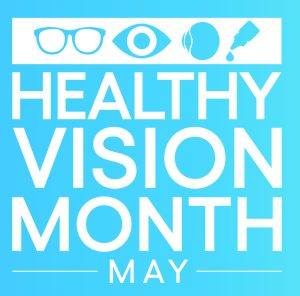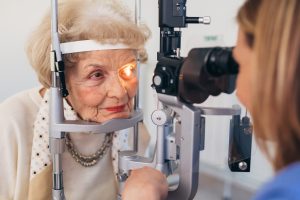 Vision loss can have a major impact on every part of life. Having a visual impairment can create challenges in performing everyday tasks, and the stigma around losing vision can be isolating — causing feelings of fear, anxiety, or depression. But you’re not alone.
Vision loss can have a major impact on every part of life. Having a visual impairment can create challenges in performing everyday tasks, and the stigma around losing vision can be isolating — causing feelings of fear, anxiety, or depression. But you’re not alone.
Healthy Vision Month 2024 is focused on helping people with a visual impairment know how to access vision rehabilitation services, mental health support, and social connections.
Get involved in Healthy Vision Month 2024 and reframe your future by helping yourself and others with a visual impairment live their best lives with vision loss.
Taking steps to care for your eyes can help prevent vision loss.
- Get a Dilated Eye Exam: a dilated eye exam can detect eye diseases at an early stage when there are no symptoms. To perform a dilated eye exam, your eye care professional puts drops in the eyes to dilate, or widen, the pupil so he or she can get a good look at the back of the eye. Early detection and treatment of eye diseases such as glaucoma or diabetic retinopathy can slow or stop vision loss and reduce the risk of blindness. Talk to your eye doctor about how often you should have a dilated eye exam.
- Be Aware of Risk Factors: The risk of vision loss and blindness is higher for some people based on race, ethnicity, and other demographic factors. Knowing about your family’s health is helpful to maintain your own eye health. Talk to your family members about their eye health history. It is important to know if anyone has been diagnosed with an eye disease, since some, such as glaucoma and diabetes have a hereditary component.
- Use protective eyewear: Protect your eyes when doing chores around the house, working in the garden, playing sports, or on the job, to prevent eye injuries from happening. This includes wearing safety glasses, goggles, safety shields, and eye guards that are made of polycarbonate.
- Wear sunglasses: When purchasing sunglasses, look for ones that block out 99 to 100% of both UVA and UVB radiation, so you can keep your vision sharp and eyes healthy. A hat offers great sun protection, too!
- Wash your hands: Before taking out your contacts and cleanse your contact lenses properly to avoid infection, be sure to make sure your hands are clean. Use only properly designated contact lens cleaning solutions.
Live a healthy lifestyle – Eating healthy foods, maintaining a healthy weight, and not smoking can significantly lower your risk of eye disease.
Which foods to eat for healthy eyes – A balanced diet rich in essential nutrients, such as antioxidants, vitamins, and minerals, can support overall eye health. Foods high in antioxidants, like leafy greens and colorful fruits, are particularly beneficial.
Eye Healthy Foods:
- Leafy greens
- Orange colored vegetables and fruit rich in Vitamin A (carrots, sweet potatoes, cantaloupe)
- Fruits and vegetables rich in Vitamin C (oranges, grapefruit, lemons)
- Food rich in Vitamin C (avocados, almonds, sunflower seeds)
- Omega-3 fatty acids (found in fish)
Foods to Avoid:
- High caffeine beverages
- High-sodium foods
- Excessive alcohol
Visit Eye Cook for eye healthy recipes.
Exercise regularly: Maintain a healthy weight with moderate exercise. Endurance, strength, balance and flexibility training are options. But there is no reason to stick with just one, think about mixing it up to reduce boredom and risk of injury while you increase your overall fitness.
For this Healthy Vision Month, take care of your eyes to make them last a lifetime.

